Special status to Kashmir has always been raked up by the mainstream Kashmiri political parties during elections. The BJP also has talked about it in its 2019 Lok Sabha election manifesto. A critique by Vijayhardik, exclusively for Different Truths.
 The elections season has announced itself. Politicians across the spectrum are busy trading barbs and profanities in a game of one-upmanship. The Election Commission of India takes over the reigns, while keeping the errant politicians in line.
The elections season has announced itself. Politicians across the spectrum are busy trading barbs and profanities in a game of one-upmanship. The Election Commission of India takes over the reigns, while keeping the errant politicians in line.
On par for the course, Kashmir is in the news once again. For all the wrong reasons. Fortunately, it is not for a terror attack. But for an attack on the integrity and sovereignty of the nation. It was perpetrated by the political parties having a dominant presence in the Kashmir valley. Often touted by the media as the mainstream parties.
The NC (National Conference) and PDP (Peoples Democratic Party) have hijacked the political discourse of the state of Jammu and Kashmir.
But these parties, the NC (National Conference) and PDP (Peoples Democratic Party) have hijacked the political discourse of the state of Jammu and Kashmir. While Kashmir is kept at the forefront of discourse by politicians and the media, the regions of Jammu and Ladakh are treated in a step-motherly fashion.
A recent example of this bias was picked up by the Twitter verse. It did make a few waves on micro blogging platform. But the shocker was that the promoter of the bias was none other than the Twitter handle of the Jammu and Kashmir tourism department. Only the tourist sites present in Kashmir valley were promoted by the government. The tourist attractions of Jammu and Ladakh did not receive any mention.
Cases are made that the population of Kashmir feels alienated from the identity of India. Doesn’t that provide an alibi to give much larger importance to Kashmir to keep the sovereignty of the country intact?
Playing devil’s advocate here, the question can be raised that the area of Kashmir has seen suffering due to insurgency, which broke out in the late 80’s. It can be argued that terrorists have wreaked havoc in the area that needs to be tackled, which makes it a bigger priority. Cases are made that the population of Kashmir feels alienated from the identity of India. Doesn’t that provide an alibi to give much larger importance to Kashmir to keep the sovereignty of the country intact?
Activists, NGOs and certain intellectual proxies try to legitimise the narrative of the Kashmir unrest in the state of Jammu and Kashmir being an indigenous movement spearheaded by the local community. The separatist elements in the society such as the Hurriyat, JKLF are projected by this cabal as political activists fighting for their identity.
…the menace of terrorism, which struck the state of Jammu and Kashmir led to the genocide and exodus of the Kashmiri Pandits from the Kashmir valley altering the demography of the region forever.
While indulging in propaganda, they conveniently forget that when the menace of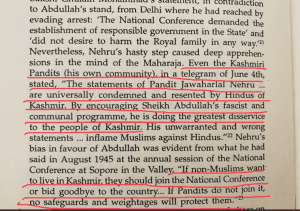 terrorism, which struck the state of Jammu and Kashmir led to the genocide and exodus of the Kashmiri Pandits from the Kashmir valley altering the demography of the region forever.
terrorism, which struck the state of Jammu and Kashmir led to the genocide and exodus of the Kashmiri Pandits from the Kashmir valley altering the demography of the region forever.
This election season the agenda has been set by the events unfolding in Jammu and Kashmir over the last couple of months. The Pulwama terror attack and its aftermath changed the political narrative in the country. The Opposition demanding proof of the air strikes and similar sentiments echoing from Pakistan has made national security a poll plank for the 2019 elections.
Clampdown on the separatist elements such as Jamaat-e-Islami and JKLF who have proudly proclaimed their role in the massacre of Kashmiri Pandits and murder of security personnel seems to have ruffled quite a few feathers in the political circles.
Further clampdown on the separatist elements such as Jamaat-e-Islami and JKLF who have proudly proclaimed their role in the massacre of Kashmiri Pandits and murder of security personnel seems to have ruffled quite a few feathers in the political circles. These recent events have spurred the ‘mainstream Kashmiri political parties’ to hold the candle for these secessionist elements.
Why do we see this happen with alarming regularity these days? Earlier these parties gave tacit support to the terror groups labelling them as ‘misguided youths’ but they were careful not to be brazen about it. Nowadays they are quite vocal about it. What is the reason for this change?
I believe the story starts with the local urban body polls, which were held last year in the state of Jammu and Kashmir. The National Conference and the PDP were against holding these elections citing inconducive political atmosphere and concerns over security as their reasons. With historical precedent on their side, both these parties called for a boycott of the local urban and rural body polls.
It provides a window for the leaders of NC and PDP to blackmail the Union Government under the flimsy garb of brandishing Article 370 and Instrument of Accession as a weapon.
But the electorate had a surprise in store for them. The elections were being held after a long gap of 13 years. Lack of elected representatives in a democratic system of governance signifies a weak federal structure. This assists in legitimising the activities of terrorists as a political struggle. It provides a window for the leaders of NC and PDP to blackmail the Union Government under the flimsy garb of brandishing Article 370 and Instrument of Accession as a weapon.
Despite the call for boycott and fearmongering on security by terrorists and the mainstream political parties, the public turned up in huge numbers and reposed their faith in electoral process and the democratic governance system of the country.
This was a jolt to leaders like Farooq Abdullah, Omar Abdullah (belonging to the NC) and Mehbooba Mufti (belonging to the PDP), who for decades have treated the state of Jammu and Kashmir as their personal fiefdom. This decline in popularity and diminishing relevance in the politics of Jammu and Kashmir has placed them in a precarious position.
Fighting for their survival in Kashmir and to appease their core electorate, they have now publicly begun to tow the line of the separatists. Bringing the focus back on the elections, let us see what the leaders of the NC and PDP had to say.
Former Chief Minister Omar Abdullah on his campaign trail has stated he wants Kashmir to have a separate Prime Minister.
Former Chief Minister Omar Abdullah on his campaign trail has stated he wants Kashmir to have a separate Prime Minister. Perhaps reminiscing a time when his grandfather Sheikh Abdullah called the shots and Nehru used to capitulate.
<blockquote class=”twitter-tweet” data-lang=”en”><p lang=”en” dir=”ltr”>Of Sheikh Abdullah, Nehru and the politics of Kashmir. How two “flamboyant” politicians served their own purpose and saddled India with the Kashmir problem. <a href=”https://t.co/Y9G202EGi7“>pic.twitter.com/Y9G202EGi7</a></p>— palki sharma (@palkisu) <a href=”https://twitter.com/palkisu/status/1113383550684999682?ref_src=twsrc%5Etfw“>April 3, 2019</a></blockquote>
<script async src=”https://platform.twitter.com/widgets.js” charset=”utf-8″></script>
Today, Omar’s father Farooq Abdullah, former Union Home Minister alleged that the government was trying to change the demographics of the Kashmir Valley. He warned the government if they would attempt any such measures Kashmir would secede from India. Irony died a painful death listening to the statement! The politicians of the Kashmiri political parties conveniently forget the ethnic cleansing of the Kashmiri Pandits.
The ex-Chief Minister of the state of Jammu and Kashmir Mehbooba Mufti threatened that abrogation of Article 370 would abrogate India’s relation with Kashmir.
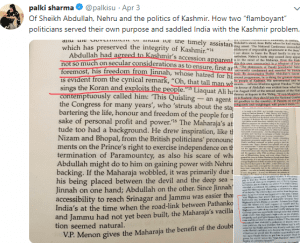 From the other party of the valley, the PDP, the ex-Chief Minister of the state of Jammu and Kashmir Mehbooba Mufti threatened that abrogation of Article 370 would abrogate India’s relation with Kashmir. Omar Abdullah too espoused similar views.
From the other party of the valley, the PDP, the ex-Chief Minister of the state of Jammu and Kashmir Mehbooba Mufti threatened that abrogation of Article 370 would abrogate India’s relation with Kashmir. Omar Abdullah too espoused similar views.
The common thread among the three statements is these politicians are vociferous about the Kashmiri cause. They are ready to fearmonger and misinform the people about the UN plebiscite, Article 370, Article 35A and intentions of the Union Government.
These political parties operate on the premise that Article 370, which was introduced as a temporary provision in the Constitution of India is interlinked to the Instrument of Accession signed by Maharaja Hari Singh of the erstwhile ruler of the princely state of Jammu and Kashmir.
The Instrument of Accession signed by Maharaja Hari Singh was enshrined within the Government of India Act,1935 and the Indian Independence Act, 1947. It did not come along with any caveats of regional autonomy.
The Instrument of Accession signed by Maharaja Hari Singh was enshrined within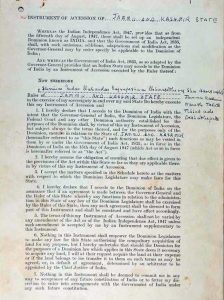 the Government of India Act,1935 and the Indian Independence Act, 1947. It did not come along with any caveats of regional autonomy. The situation we face today is creation of the mismanagement of the Kashmir issue by Nehru. As a result of which Article 370 was instituted as a temporary measure in October 1949.
the Government of India Act,1935 and the Indian Independence Act, 1947. It did not come along with any caveats of regional autonomy. The situation we face today is creation of the mismanagement of the Kashmir issue by Nehru. As a result of which Article 370 was instituted as a temporary measure in October 1949.
Thus, the premise of the accession of the state of Jammu and Kashmir to the Union of India linked to Article 370 of the Constitution does not hold true.
This temporary provision has been used as a political instrument by the Kashmiri political parties to create for themselves a dual power centre. Measures initiated under the provision have made it possible for them to hold the government of the day at ransom and ensuring their political existence.
Amidst all the hyperbole that has been churned out by the feudalistic political parties, the real victim has been the common citizen.
While they shed rivers over Kashmir, not a word is heard on Jammu and Ladakh. They criticise the policies of the Indian government for alienating the Kashmiri youth. But deprive the youth of Jammu and Ladakh opportunities of employment and development by rooting for tools of alienation such as Article 370 and 35a.
Perfecting the art of double speak over the years, they have consciously deprived the population of Jammu and Kashmir of means to seek a better life.
Perfecting the art of double speak over the years, they have consciously deprived the population of Jammu and Kashmir of means to seek a better life. Constrained by the special privileges accorded to the state, it is difficult for industries to set shop. So the state is completely reliant on central assistance for survival. Yet, it is the fault of the Central government that local youth pick up the gun.
Fanning the flames of separatist ideology, the Kashmiri political parties have held onto power. They let the sense of alienation simmer to make the state of Jammu and Kashmir their personal fiefdom. Now that their monopoly to rule the state is being threatened, they are whipping up emotions of people to stay relevant.
What makes it more interesting and alarming is that in recent days members of the Pakistani government are parroting the same lines amidst the Indian election season. Now the question remains are these hallucinations funded from across the border? Or has the mask come off?
Visuals sourced by the author

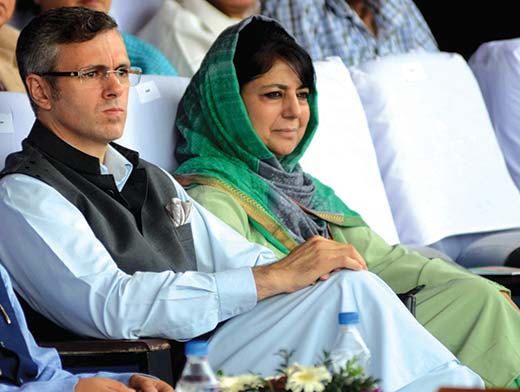
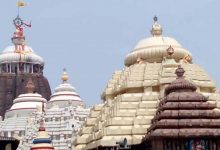



 By
By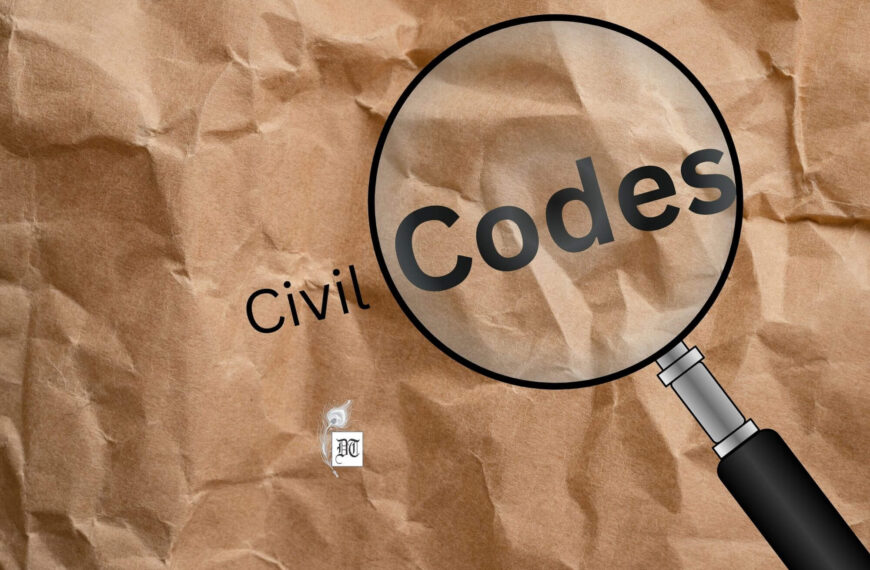
 By
By
 By
By
.Wow!!! Well written
Thank you!